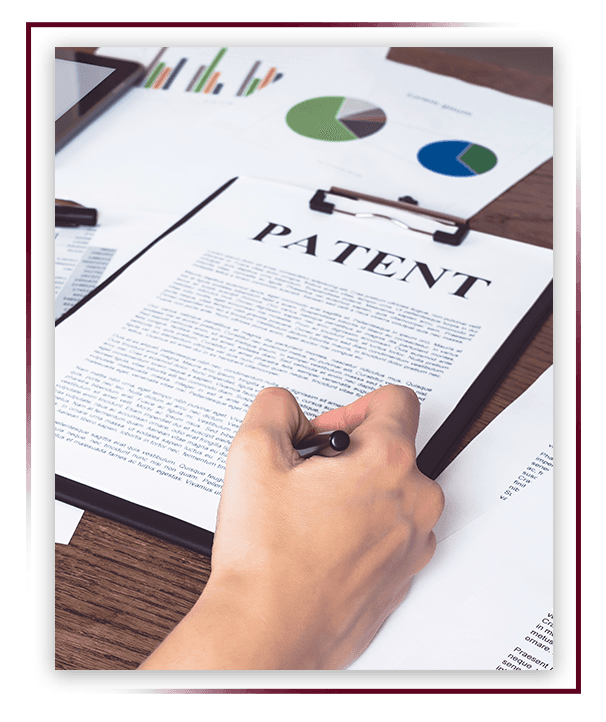

Mobile Intellectual Property Attorneys
Protection Against Patent, Trademark & Copyright Infringement in Alabama, Florida, and Mississippi
The attorneys at Satterwhite Law Firm, LLC, have handled high-profile and complicated intellectual property matters with extraordinary results. Our experience spans a range of industries, from new and creative medical devices to innovative modifications to electric guitars.
Our intellectual property attorneys in Mobile work closely with our clients to develop legal strategies to protect their unique ideas, inventions, brands and businesses. We have helped launch many innovative startups, advised them about growth and financing options, and helped these fledgling companies gain a successful position in a competitive market.
In addition, we have lawyers dedicated to negotiating, structuring and closing complex transactions driven by innovation or technological opportunities, including licenses, joint ventures and other commercial agreements. Due to the diversity of our client base, we can see business arrangements from all perspectives, and fully understand the diverse needs of all parties to a particular transaction. That is why our clients retain us for complex IP transactions, such as Angel investments and other financing rounds, as well as Initial Public Offerings, in their journey from merely an idea to a market disrupting enterprise.
When it comes to trial, our lawyers have actually tried cases and won them. Therefore, Satterwhite Law’s trial attorneys in Mobile are prepared to advocate for our clients in complex IP litigation cases before the juries, judges, and arbitrators, in any state or federal court. We represent corporations, limited liability companies, and individuals in all phases of litigation, from obtaining and defeating initial TROs and preliminary injunctions, through final appeals to the U.S. Supreme Court. We understand litigation, and we always formulate legal strategies with the client’s business interests in mind.
Intellectual property law includes much more than just patents, trademarks and copyrights, and Satterwhite Law can manage all the intellectual property needs for our clients. Some of our routine practice areas are included below.
Learn more about how our Mobile intellectual property lawyer can help you by contacting us online or calling (251) 325-5141 today!
Satterwhite Law Firm Practice Areas
- Intellectual Property Counseling
- Patent Prosecution, Patent Infringement and Litigation
- Copyright Prosecution and Litigation
- Trademark Prosecution and Litigation
- Internet-Related Counseling and Litigation
- Trade Secrets Counseling and Litigation
- Defamation
- False Advertising
- Privacy and Publicity Rights
- Unfair Competition

How Our Mobile Intellectual Property Lawyer Can Help You
Mobile Patents: Your Guide to Intellectual Property Rights
A patent is an exclusive right granted for an invention, and provides the patent owner with the right to decide how the invention can be legally used by others, if at all. In exchange for this right, the patent owner makes technical information about the invention publicly available in a published patent document.
An inventor who wants patent protection must apply to the U.S. Patent and Trademark Office ("USPTO") in order to obtain it. That application process can be long and complicated. At Satterwhite Law, the first task of one of our intellectual property attorneys will be to discuss with you the complexity of your invention, the possibility that your patent will be challenged, and the time that you personally have to commit to the sometimes-involved registration process.
Almost all inventors need this affordable, common sense analysis from one of our attorneys in Mobile, providing you with a clear understanding if your idea is patentable and other critical IP considerations. Satterwhite Law is ready for the task.
Some important terms to learn and know during your discussion with one of our lawyers about the patent application process:
- Patent Prosecution: A process by which the inventor or patent law practitioner guides the application through the USPTO, including when the USPTO patent examiners possibly challenge the validity of the patent.
- Provisional Patent Application ("PPA"): A short, informal document containing text and drawings that describe how to make and use an invention; establish an effective filing date for an invention; and enable an applicant to use the term "patent pending" on the invention. The PPA expires unless a regular patent application is filed within one year of having filed the PPA.
We would be more than happy to schedule an appointment to discuss the entire patent process with you, as we have with so many other inventors and entrepreneurs.
Understanding Trademarks: Protect Your Brand in Mobile
A trademark is a sign capable of distinguishing the goods or services of one enterprise from those of other enterprises. Trademarks date back to ancient times when artisans used to put their signature or "mark" on their products.
Our intellectual property lawyers in Mobile are frequently called on to provide strategic advice on how best to establish, protect, maintain and enhance valuable trademarks, including building our client’s brands and businesses.
The attorneys at Satterwhite Law would welcome the opportunity to offer you a wide variety of these trademark services, including all aspects of clearance, prosecution and enforcement.
Copyrights: Safeguarding Your Creative Works
Artists and creators own the rights to their creative literary and artistic works. Works covered by copyright range from books, music, paintings, sculpture and films, to computer programs, databases, advertisements, maps and technical drawings.
Our attorneys are uniquely qualified to assist our clients with protecting such rights, and would enjoy the opportunity to discuss our services with you.
IP Transactions: Navigating Complex Agreements
The attorneys at Satterwhite law have experience in structuring transactions and leading negotiations driven by innovation or technological opportunities. These include joint ventures, strategic alliances, outsourcing, collaborations, licenses, royalty agreements, and other commercial arrangements.
In addition to understanding law and technology, the attorneys at Satterwhite Law are experienced, practical transactional lawyers who understand how to structure, negotiate and close these complex transactions.
Licensing: Protecting Your Intellectual Property Rights
Our attorneys have experience representing licensors of intangible assets and attendant intellectual property rights. These matters include license arrangements involving patents, technology, copyrights, trademarks and brands. We recognize the business interests of both the owners/licensors, as well as the licensees, which are frequently aligned, but can occasionally diverge.
Trade Secrets Litigation: Defending Your Business Interests
Our Mobile intellectual property attorneys have experience representing both plaintiffs and defendants in trade secrets matters in diverse industries. They draw upon this formidable depth of knowledge of intellectual property, commercial litigation, and other practices area to provide an approach tailored to each individual client.
Trade secret holders frequently seek expedited injunctive relief that can result in mini trials at the beginning of cases. We can rapidly mobilize attorneys who work closely with clients, quickly get up to speed on the clients’ technology, and build persuasive case strategies because of our firm’s size, sophistication and experience.
If you have questions about Intellectual Property Law, or would like to discuss your particular concerns with one of our attorneys in Mobile & beyond, we welcome you to contact us by calling (251) 325-5141.
Intellectual Property
Frequently Asked Questions
-
Intellectual Property
-
What happens if someone steals a trade secret?The owner of the trade secret can get an injunction in civil court, which will order the thief to refrain from any further disclosure or use of the secret. Also, the owner may be able to receive damages for any losses caused by the theft or disclosure of the secret. They would need to show that they kept the information secret and that it confers a competitive advantage, and the defendant improperly acquired or disclosed the information. Sometimes the thief will face criminal prosecution as well. Laws such as the federal Economic Espionage Act impose substantial fines and years in prison for the intentional theft of trade secrets by individuals or companies. Some states impose their own criminal penalties for trade secret theft.
-
How should I protect my trade secrets?The extent of your precautions will depend on the value of the secrets. You do not need to surround your business with barbed wire and an army of guards, but you should make sure to consistently use non-disclosure agreements, mark folders as confidential, lock away confidential information when you leave the business, use computer passwords, and limit the number of people who can get access to confidential information.
-
What rights do I have as an owner of a trade secret?You can prevent anyone subject to a non-disclosure agreement or an automatic duty of confidentiality from revealing the secret without permission, or from copying the secret, using it, or otherwise benefiting from it. For example, an employee would be subject to an automatic duty of confidentiality.
-
What is a trade secret?A trade secret is any type of information, idea, product, device, formula, or combination of these that gives its owner an advantage over the competition. Its owner must take reasonable steps to keep it secret to preserve protection. A trade secret will remain protected as long as its owner maintains secrecy. It might involve not only information about what works well for your type of business but also information about what does not work well. In short, a trade secret can cover anything that is not generally known if it has some business value.
-
How do I protect a food recipe?You probably cannot protect it with a patent, since you would struggle to meet the novelty requirement. Copyright protection might be a good option if you include the recipe in a cookbook that compiles various recipes. A recipe on its own probably cannot receive copyright protection because it does not meet the minimal creativity requirement in terms of literary expression. A cookbook might get protection because choosing the recipes in the compilation and writing additional text to describe them might show enough creativity to meet the standard. If you are planning to sell the food to consumers, you might be able to protect the name and label of the dish by getting a trademark, but the trademark does not protect the recipe. Your best option might be protecting the recipe as a trade secret. This requires asking anyone else who needs to know the recipe to sign a non-disclosure agreement. Trade secrets do not provide protection against reverse engineering recipes.
-
Can someone else use the name of my business for their business?This depends on the degree to which your products and services overlap. If the businesses are located in different parts of the country and serve different audiences, each business likely is free to use the same name. This is because consumers would not be confused and would not assume that the businesses are connected. The purpose of trademark law is to protect consumers from confusion. Even if you have a registered trademark for your business name, this does not mean that you can sue for infringement unless you can show a likelihood of consumer confusion.
-
Am I liable if I sell items that infringe on a copyright in my consignment shop?You may be liable as a “secondary infringer” if you are aware of the infringement and agree to sell the items. This means that the copyright owner could sue you for damages. If your shop is a small business, though, the copyright owner probably will not detect the violation and file a lawsuit against you, since they will be focused on suing larger infringing entities. Instead of suing you, they may just send a cease and desist letter. If you remove any items that you know are infringing when you receive this letter, this should forestall any further legal action.
-
Do I need permission from the copyright owner to use part of a song?Generally, yes. You would need to get permission from both the copyright owner of the song and the copyright owner of the recording. However, this is not always easy or even feasible, since the owners may not respond or may demand huge fees. You may want to check to make sure that copyright protection still applies before going through this process. Many songs recorded in the 1960s or earlier have entered the public domain, which means that anyone can use them without getting permission. Even if you are unable to get permission, and the song is not in the public domain, you may be able to argue that fair use protects you. This usually requires showing that you are using only a small portion of the song, you are not making a profit from your use, and you are not otherwise harming the value of the work or invading the market for it. Realistically, the copyright owner may never find out about your use if you do not make money from it, or if it does not attract substantial attention. If they do find out, they may send a cease and desist letter rather than filing a formal lawsuit. You should be able to resolve the issue by removing the material described in the letter, without further consequences.
-
How long does copyright protection last?If a work was published in 1978 or later, copyright protection lasts for the life of the author and 70 years afterward. If the author was anonymous or published under a pseudonym, or if the work was made for hire, copyright protection lasts for 95 years after the work was published or 120 years after it was created, whichever is less. (However, if the name of the author of an anonymous or pseudonymous work is disclosed to the Copyright Office, protection will last for 70 years after the death of the author.) If a work was published in 1977 or earlier, copyright protection usually lasts for 95 years after the work was published. If a work was published in 1963 or earlier, the copyright owner must have renewed the copyright 28 years after it was granted to receive the full 95-year protection period. Once the period of protection expires, the work enters the public domain, which means that it can be used without seeking the owner's permission.
-
What happens if a company uses my idea without permission?You may be able to sue the company for copyright or patent infringement if you put down your idea in some type of protectable form. This does not necessarily mean that you have a registered patent or copyright, but you at least need to have written it down, filed a provisional patent application, or done something similar. If you have not done this, you still may be able to sue if the company signed a non-disclosure agreement before discussing the idea with you. This would be similar to a breach of contract case. Finally, you may be able to sue based on a breach of an implied agreement if your idea was a trade secret or in certain other circumstances, but these cases are usually hard to win.
-
How long does patent protection last?If you have a utility patent, protection usually lasts for 20 years after the filing date of the application. If you filed the application before June 8, 1995, patent protection may last for 17 years after the patent was issued if this provides longer protection than the 20-year period. If you have a design patent, protection lasts for 14 years after the patent was issued. If you have a plant patent, protection lasts for 17 years after the patent was issued.
-
Can I get a patent for an invention if I am employed by a company?Generally not. Your employer probably will have patent rights for any invention that you create in the course of your employment. However, your employment contract may provide bonuses for inventions that prove valuable. If your employment contract does not cover this issue, the employer still will have patent rights under the employed-to-invent doctrine if you were hired or told to create an invention, or hired or told to perform a defined task that resulted in creating the invention. In situations in which neither an employment agreement nor the employed-to-invent doctrine applies, an employer may have a shop right in an invention. This means that the employee owns the patent, while their employer can use the patented invention without paying the employee in addition to their regular salary. A shop right arises when the employee uses the employer’s resources during the invention process.
-
Can I get a patent for computer software?You may be able to get a patent for computer software if it produces a useful and tangible result. In other words, you can receive protection for a specific application of a mathematical formula, even though you cannot receive protection for the formula.
-
When is an invention useful?An invention is useful if it has a functional result that benefits some people in some way. This is not a high threshold to meet. The benefit does not need to be significant and can be simply humorous. However, the applicant needs to show that the invention works or can be expected to work. (If you are applying for a design patent or a plant patent, you do not need to meet this requirement.)
-
When is an invention non-obvious?An invention is non-obvious if the typical person in the field would not view it as a predictable development. This takes into account some level of specialized knowledge, but not necessarily the inventor’s level of knowledge. The non-obviousness requirement is highly subjective. It requires the patent examiner to consider only the inventions in the field that existed on the date that the application was filed, even though the evaluation usually occurs much later.
-
When is an invention novel?An invention is novel if at least one of its elements is different from existing inventions in the field. Determining whether an invention meets this requirement involves reviewing all the existing inventions in the field at the time that the applicant filed the patent application. You cannot meet this requirement if your invention was described in a publication or used in public before you filed the application, unless you described the invention in a publication no more than one year before filing the application.
-
What things can I not patent?You cannot get a patent for a mathematical formula, a law of nature, or a scientific principle that has no functional application. Nor can you get a patent for a naturally occurring substance that you discovered. Also, public policy prevents granting patents for inventions that have only illegal uses, pharmaceuticals that are not safe to market to the public, or ways of conducting surgery on people. Other types of subject matter that cannot receive patent protection include processes that consist entirely of human motor coordination, as well as printed materials that lack a distinctive shape or structure. If you have composed a creative work, such as a song, a movie, or a novel, copyright would be the appropriate form of protection, rather than a patent.
-
What things can I patent?The most common type of patent is a utility patent. You can potentially get a utility patent for a machine, an article of manufacture, a composition of matter, or a process or method that produces a useful and tangible result. For any of these inventions, you also may be able to get a patent for an improvement. In addition, the invention must be useful, novel, and non-obvious. You also can get a design patent for a design feature of a product if it is novel, non-obvious, and not related to the functionality of the product. Plants can qualify for a specific type of patent if they are novel and non-obvious. Large companies usually obtain these patents, which are rare.
-
Contact Satterwhite Reece Law Firm Today


